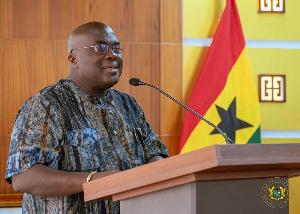Justice Irene Charity Larbi, Judge-In-Charge of Alternative Dispute Resolution (ADR), said a total of 3,041 cases, representing 40 per cent of settlement rate were achieved in 2019 using ADR mechanisms out of 6,209 that were mediated in the year.
She said the use of the ADR mechanisms helped reduce backlog of cases substantially in the courts, decongest the courts, and thus allowing judges to have ample time to handle cases not amenable to ADR.
Justice Larbi was speaking at the launch of this year's ADR Week in Ho, the Volta Regional capital on the theme: “Making our Courts user friendly through the use of ADR".
The Judge said the courts could only be friendly when the adjudication process was expeditious, devoid of unnecessary expenses and ensured that all matters in dispute were completely, effectively and finally determined and the multiplicity of proceedings concerning such matters were avoided.
She said though the regular court system had its strength, it was sometime characterized by factors, which occasioned delays and cost, and therefore underscored the importance of ADR mechanisms in quick and quality justice delivery and called on all the citizenry to embrace and nurture it.
“The ADR mechanisms is a reliable partner to the traditional justice delivery system and must therefore, be embraced and nurtured for a quality justice delivery system," she stated.
Justice Larbi said it was imperative for the Judicial Administration to place much premium on ADR in its quest to promote excellence, speed and efficiency in the justice system as ADR aimed at complementing the traditional court system in making access to justice cheaper, easier, expeditious, non-adversarial and faster for the citizenry.
“We can only achieve the excellence we seek if the judicial outcomes are not the product of long, drawn out processes that lead to pyrrhic victories for parties in a dispute," she said.
The Judge said ADR provided healthier method for resolving disputes, enabled parties to willingly comply with agreements reached as well as ensured that parties became happy with the outcome as “people who design solution to their conflicts are satisfied with the outcome than people who leave the resolution of their dispute in the hands of another person or authority".
She said ADR cuts down costs of litigations, making justice more accessible to greater number of the citizenry, enabled parties to express their emotional needs and empowered individuals in the case as it gave them the opportunity to be heard and contribute to the outcome of the case, which would be beneficial to them.
Justice Larbi said ADR would become a major plank in some years to come, which would be “the go-to option for seeking justice as long as the nature of the case admitted of the intervention of ADR, not just a complement to the justice delivery architecture”.
Justice Eric Baah, Supervising High Court Judge, Volta and Oti Regions, urged the citizenry to embrace the ADR system as it was short, simple and less expensive in resolving cases.
He said the traditional justice system was overwhelmed with disputes and therefore unable to resolve cases in such a timely manner the citizenry expected.
Justice Baah also pointed out that the court system also lacked certain vital equipment, making it difficult for justice to be delivered expeditiously.
The ADR Week is a week set aside in each Legal Year Term aimed at creating awareness and educating the citizenry on the importance of ADR, so they could embraced it to enhance justice delivery.
The Week also offers opportunity to parties who have their cases pending in courts that are connected to the ADR Programme to have them settled through mediation and other ADR resolution mechanisms.
General News of Wednesday, 11 March 2020
Source: GNA













